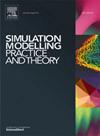A discrete-event multi-agent simulation framework supporting well-to-wheel analysis for greening commercial maritime ports
IF 3.5
2区 计算机科学
Q2 COMPUTER SCIENCE, INTERDISCIPLINARY APPLICATIONS
引用次数: 0
Abstract
This paper develops a discrete-event multi-agent simulation model that may support robust and realistic well-to-wheel analysis to assess energy consumption and greenhouse gas emissions of greener technologies applied to container terminal activities. To this end, a discrete-event simulation multi-agent model was specifically developed and validated with real data for the port of Salerno (southern Italy), and a well-to-wheel analysis was carried out by comparing different scenarios with an increasing level of port electrification solutions. A comparison is proposed in terms of consumption and emissions between conventionally fueled and “green” vehicles, including cold ironing technology. The proposed modeling framework makes it possible to simulate highly complex logistics systems in which the environmental and energetic performance of the handling equipment may significantly differ and be significantly affected by human factors and external factors. Our results show that the greener scenario allows higher emissions reduction based on the energy sources used to produce electricity.
求助全文
约1分钟内获得全文
求助全文
来源期刊

Simulation Modelling Practice and Theory
工程技术-计算机:跨学科应用
CiteScore
9.80
自引率
4.80%
发文量
142
审稿时长
21 days
期刊介绍:
The journal Simulation Modelling Practice and Theory provides a forum for original, high-quality papers dealing with any aspect of systems simulation and modelling.
The journal aims at being a reference and a powerful tool to all those professionally active and/or interested in the methods and applications of simulation. Submitted papers will be peer reviewed and must significantly contribute to modelling and simulation in general or use modelling and simulation in application areas.
Paper submission is solicited on:
• theoretical aspects of modelling and simulation including formal modelling, model-checking, random number generators, sensitivity analysis, variance reduction techniques, experimental design, meta-modelling, methods and algorithms for validation and verification, selection and comparison procedures etc.;
• methodology and application of modelling and simulation in any area, including computer systems, networks, real-time and embedded systems, mobile and intelligent agents, manufacturing and transportation systems, management, engineering, biomedical engineering, economics, ecology and environment, education, transaction handling, etc.;
• simulation languages and environments including those, specific to distributed computing, grid computing, high performance computers or computer networks, etc.;
• distributed and real-time simulation, simulation interoperability;
• tools for high performance computing simulation, including dedicated architectures and parallel computing.
 求助内容:
求助内容: 应助结果提醒方式:
应助结果提醒方式:


